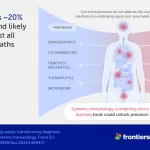 heart
heart
January 17, 2024
A groundbreaking study published last month in Nature Communications has uncovered a potential link between meal timing and cardiovascular health, with specific attention to breakfast and dinner schedules. The research, led by Bernard Srour, PharmD, PhD, MPH, and his colleagues, is the first of its kind to establish a connection between heart health and the timing of meals, offering valuable insights for preventive strategies.
The study, conducted using data from over 103,000 adults enrolled in the NutriNet-Santé study in France, analyzed the timing of meals and its impact on cardiovascular outcomes. Participants who had breakfast after 9 a.m. and dinner after 9 p.m. were found to have a higher risk of cardiovascular issues, particularly among women.
Srour emphasized that while previous studies explored links between skipping breakfast and metabolic health, this research delves into the connection between meal timing and cardiovascular diseases, opening doors to potential prevention strategies.
The analysis, spanning a median of 7.2 years, revealed that each additional hour of delay in both the first and last meals of the day was associated with a higher risk of overall cardiovascular disease. Those who ate their last meal after 9:00 p.m. faced a 28% higher risk of cerebrovascular disease compared to those who finished their last meal before 8:00 p.m.
The study suggests that the interplay between meal timing and circadian rhythm, regulating factors such as blood pressure, metabolism, and hormonal secretion, plays a crucial role in heart health. Insulin sensitivity, influenced by circadian rhythm, was highlighted as a significant factor. Previous research indicates that the body is more insulin-sensitive in the morning, and decreased sensitivity in the evening can lead to cardiometabolic disorders.
Bhupendar Tayal, MD, a cardiologist, explained that delaying morning meals might contribute to poor insulin uptake and increase heart health risks. Additionally, eating later in the evening, when melatonin levels are at their peak, could impair food metabolism.
While the study reveals a correlation between meal timing and cardiovascular health, it’s essential to note that the findings show correlation, not necessarily causation. Factors like additional less-healthy behaviors in later-dining individuals may contribute to the increased risk of heart disease.
Srour suggested an early morning and early evening eating pattern to ensure a long enough nighttime fasting duration, indicating potential heart-healthy meal timing. However, more research is needed to confirm cardiovascular outcomes.
Cardiologist Tayal emphasized the importance of consistent eating, avoiding meal skipping, and opting for an early breakfast and an evening meal at least three hours before bedtime.
In addition to adjusting meal timing, experts recommend focusing on a heart-healthy diet rich in fruits, vegetables, whole grains, nuts, and fish, while minimizing processed foods, sugars, and high-sodium items. The American Heart Association’s guidelines align with these dietary recommendations for optimal cardiovascular health.










